英语第二册翻译
- 格式:doc
- 大小:29.00 KB
- 文档页数:10
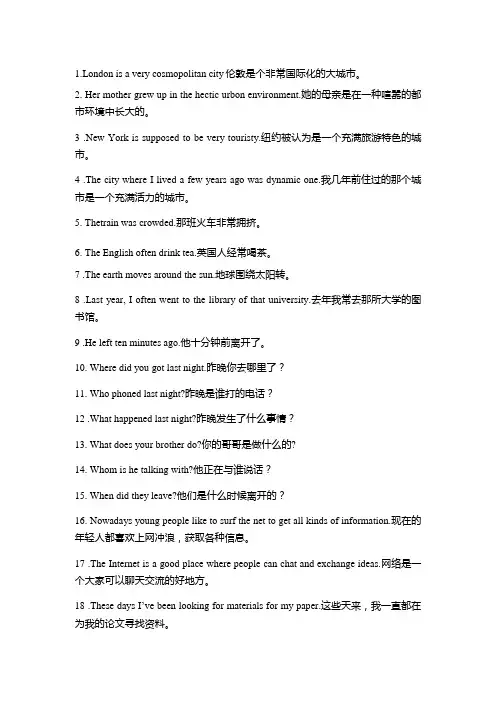
1.London is a very cosmopolitan city伦敦是个非常国际化的大城市。
2. Her mother grew up in the hectic urbon environment.她的母亲是在一种喧嚣的都市环境中长大的。
3 .New York is supposed to be very touristy.纽约被认为是一个充满旅游特色的城市。
4 .The city where I lived a few years ago was dynamic one.我几年前住过的那个城市是一个充满活力的城市。
5. Thetrain was crowded.那班火车非常拥挤。
6. The English often drink tea.英国人经常喝茶。
7 .The earth moves around the sun.地球围绕太阳转。
8 .Last year, I often went to the library of that university.去年我常去那所大学的图书馆。
9 .He left ten minutes ago.他十分钟前离开了。
10. Where did you got last night.昨晚你去哪里了?11. Who phoned last night?昨晚是谁打的电话?12 .What happened last night?昨晚发生了什么事情?13. What does your brother do?你的哥哥是做什么的?14. Whom is he talking with?他正在与谁说话?15. When did they leave?他们是什么时候离开的?16. Nowadays young people like to surf the net to get all kinds of information.现在的年轻人都喜欢上网冲浪,获取各种信息。
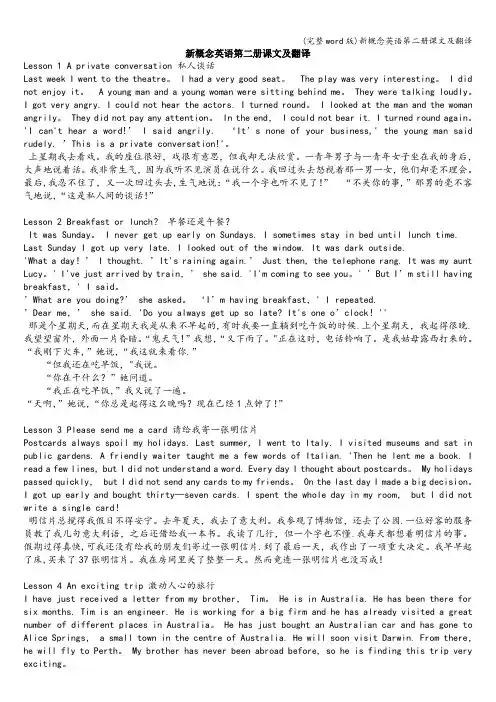
新概念英语第二册课文及翻译Lesson 1 A private conversation 私人谈话Last week I went to the theatre。
I had a very good seat。
The play was very interesting。
I did not enjoy it。
A young man and a young woman were sitting behind me。
They were talking loudly。
I got very angry. I could not hear the actors. I turned round。
I looked at the man and the woman angrily。
They did not pay any attention。
In the end, I could not bear it. I turned round again。
'I can't hear a word!’ I said angrily. ‘It’s none of your business,' the youn g man said rudely. ’This is a private conversation!'。
上星期我去看戏。
我的座位很好,戏很有意思,但我却无法欣赏。
一青年男子与一青年女子坐在我的身后,大声地说着话。
我非常生气,因为我听不见演员在说什么。
我回过头去怒视着那一男一女,他们却毫不理会。
最后,我忍不住了,又一次回过头去,生气地说:“我一个字也听不见了!”“不关你的事,”那男的毫不客气地说,“这是私人间的谈话!”Lesson 2 Breakfast or lunch?早餐还是午餐?It was Sunday。
I never get up early on Sundays. I sometimes stay in bed until lunch time. Last Sunday I got up very late. I looked out of the window. It was dark outside.'What a day!’ I thought. ’It's raining again.’ Just then, the telephone rang. It was my aunt Lucy。
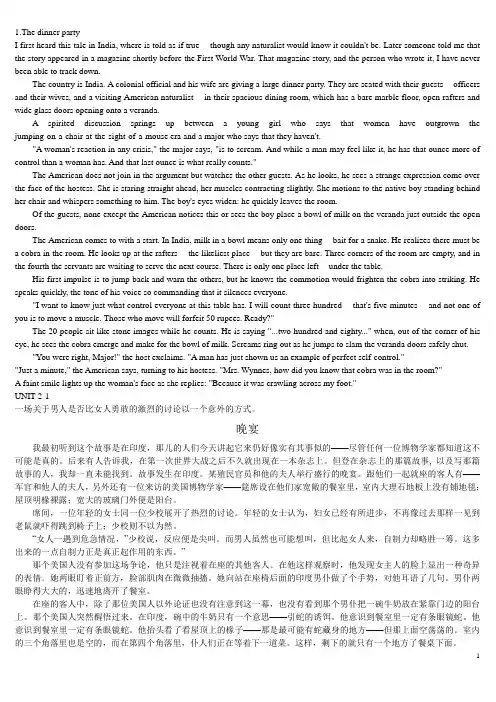
1.The dinner partyI first heard this tale in India, where is told as if true -- though any naturalist would know it couldn't be. Later someone told me that the story appeared in a magazine shortly before the First World War. That magazine story, and the person who wrote it, I have never been able to track down.The country is India. A colonial official and his wife are giving a large dinner party. They are seated with their guests -- officers and their wives, and a visiting American naturalist -- in their spacious dining room, which has a bare marble floor, open rafters and wide glass doors opening onto a veranda.A spirited discussion springs up between a young girl who says that women have outgrown the jumping-on-a-chair-at-the-sight-of-a-mouse era and a major who says that they haven't."A woman's reaction in any crisis," the major says, "is to scream. And while a man may feel like it, he has that ounce more of control than a woman has. And that last ounce is what really counts."The American does not join in the argument but watches the other guests. As he looks, he sees a strange expression come over the face of the hostess. She is staring straight ahead, her muscles contracting slightly. She motions to the native boy standing behind her chair and whispers something to him. The boy's eyes widen: he quickly leaves the room.Of the guests, none except the American notices this or sees the boy place a bowl of milk on the veranda just outside the open doors.The American comes to with a start. In India, milk in a bowl means only one thing -- bait for a snake. He realizes there must be a cobra in the room. He looks up at the rafters -- the likeliest place -- but they are bare. Three corners of the room are empty, and in the fourth the servants are waiting to serve the next course. There is only one place left -- under the table.His first impulse is to jump back and warn the others, but he knows the commotion would frighten the cobra into striking. He speaks quickly, the tone of his voice so commanding that it silences everyone."I want to know just what control everyone at this table has. I will count three hundred -- that's five minutes -- and not one of you is to move a muscle. Those who move will forfeit 50 rupees. Ready?"The 20 people sit like stone images while he counts. He is saying "...two hundred and eighty..." when, out of the corner of his eye, he sees the cobra emerge and make for the bowl of milk. Screams ring out as he jumps to slam the veranda doors safely shut."You were right, Major!" the host exclaims. "A man has just shown us an example of perfect self-control.""Just a minute," the American says, turning to his hostess. "Mrs. Wynnes, how did you know that cobra was in the room?"A faint smile lights up the woman's face as she replies: "Because it was crawling across my foot."UNIT 2-1一场关于男人是否比女人勇敢的激烈的讨论以一个意外的方式。
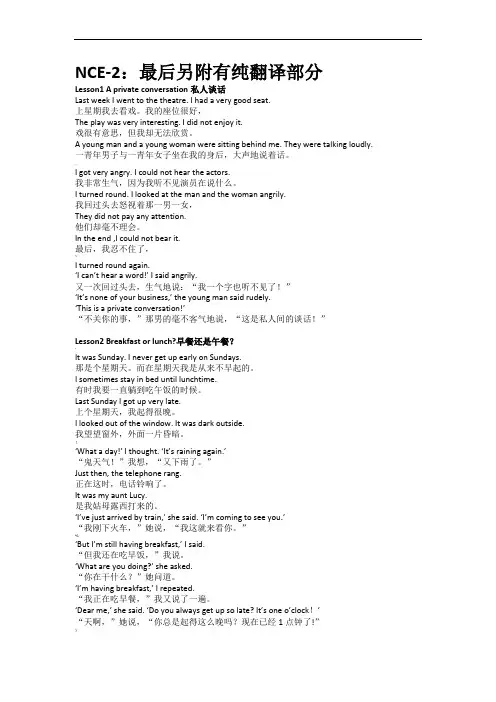
NCE-2:最后另附有纯翻译部分Lesson1 A private conversation私人谈话Last week I went to the theatre. I had a very good seat.上星期我去看戏。
我的座位很好,The play was very interesting. I did not enjoy it.戏很有意思,但我却无法欣赏。
A young man and a young woman were sitting behind me. They were talking loudly.一青年男子与一青年女子坐在我的身后,大声地说着话。
I got very angry. I could not hear the actors.我非常生气,因为我听不见演员在说什么。
I turned round. I looked at the man and the woman angrily.我回过头去怒视着那一男一女,They did not pay any attention.他们却毫不理会。
In the end ,I could not bear it.最后,我忍不住了,~I turned round again.‘I can’t hear a word!’ I said angrily.又一次回过头去,生气地说:“我一个字也听不见了!”‘It’s none of your business,’ the young man said rudely.‘This is a private conversation!’“不关你的事,”那男的毫不客气地说,“这是私人间的谈话!”Lesson2 Breakfast or lunch?早餐还是午餐?'It was Sunday. I never get up early on Sundays.那是个星期天。
而在星期天我是从来不早起的。
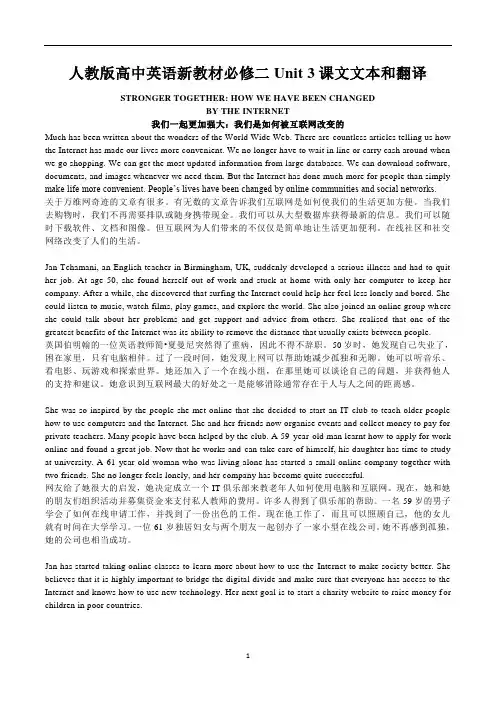
人教版高中英语新教材必修二Unit 3课文文本和翻译STRONGER TOGETHER: HOW WE HAVE BEEN CHANGEDBY THE INTERNET我们一起更加强大:我们是如何被互联网改变的Much has been written about the wonders of the World Wide Web. There are countless articles telling us how the Internet has made our lives more convenient. We no longer have to wait in line or carry cash around when we go shopping. We can get the most updated information from large databases. We can download software, documents, and images whenever we need them. But the Internet has done much more for people than simply make life more convenient. People’s lives have been changed by online communities and social networks.关于万维网奇迹的文章有很多。
有无数的文章告诉我们互联网是如何使我们的生活更加方便。
当我们去购物时,我们不再需要排队或随身携带现金。
我们可以从大型数据库获得最新的信息。
我们可以随时下载软件、文档和图像。
但互联网为人们带来的不仅仅是简单地让生活更加便利。
在线社区和社交网络改变了人们的生活。
Jan Tchamani, an English teacher in Birmingham, UK, suddenly developed a serious illness and had to quit her job. At age 50, she found herself out of work and stuck at home with only her computer to keep her company. After a while, she discovered that surfing the Internet could help her feel less lonely and bored. She could listen to music, watch films, play games, and explore the world. She also joined an online group wh ere she could talk about her problems and get support and advice from others. She realised that one of the greatest benefits of the Internet was its ability to remove the distance that usually exists between people.英国伯明翰的一位英语教师简•夏曼尼突然得了重病,因此不得不辞职。
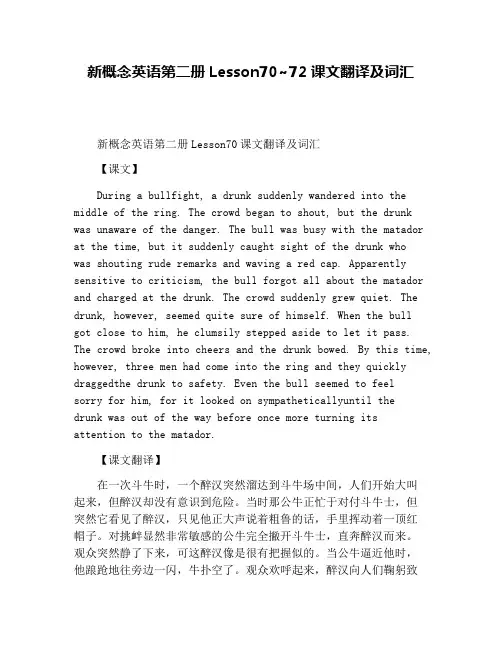
新概念英语第二册Lesson70~72课文翻译及词汇新概念英语第二册Lesson70课文翻译及词汇【课文】During a bullfight, a drunk suddenly wandered into the middle of the ring. The crowd began to shout, but the drunk was unaware of the danger. The bull was busy with the matador at the time, but it suddenly caught sight of the drunk whowas shouting rude remarks and waving a red cap. Apparently sensitive to criticism, the bull forgot all about the matador and charged at the drunk. The crowd suddenly grew quiet. The drunk, however, seemed quite sure of himself. When the bullgot close to him, he clumsily stepped aside to let it pass. The crowd broke into cheers and the drunk bowed. By this time, however, three men had come into the ring and they quickly draggedthe drunk to safety. Even the bull seemed to feelsorry for him, for it looked on sympatheticallyuntil thedrunk was out of the way before once more turning itsattention to the matador.【课文翻译】在一次斗牛时,一个醉汉突然溜达到斗牛场中间,人们开始大叫起来,但醉汉却没有意识到危险。
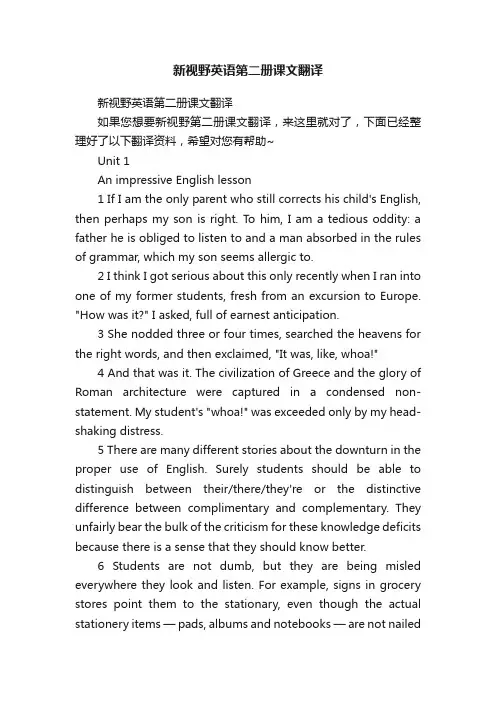
新视野英语第二册课文翻译新视野英语第二册课文翻译如果您想要新视野第二册课文翻译,来这里就对了,下面已经整理好了以下翻译资料,希望对您有帮助~Unit 1An impressive English lesson1 If I am the only parent who still corrects his child's English, then perhaps my son is right. To him, I am a tedious oddity: a father he is obliged to listen to and a man absorbed in the rules of grammar, which my son seems allergic to.2 I think I got serious about this only recently when I ran into one of my former students, fresh from an excursion to Europe. "How was it?" I asked, full of earnest anticipation.3 She nodded three or four times, searched the heavens for the right words, and then exclaimed, "It was, like, whoa!"4 And that was it. The civilization of Greece and the glory of Roman architecture were captured in a condensed non-statement. My student's "whoa!" was exceeded only by my head-shaking distress.5 There are many different stories about the downturn in the proper use of English. Surely students should be able to distinguish between their/there/they're or the distinctive difference between complimentary and complementary. They unfairly bear the bulk of the criticism for these knowledge deficits because there is a sense that they should know better.6 Students are not dumb, but they are being misled everywhere they look and listen. For example, signs in grocery stores point them to the stationary, even though the actual stationery items — pads, albums and notebooks — are not naileddown. Friends and loved ones often proclaim they've just ate when, in fact, they've just eaten. Therefore, it doesn't make any sense to criticize our students.7 Blame for the scandal of this language deficit should be thrust upon our schools, which should be setting high standards of English language proficiency. Instead, they only teach a little grammar and even less advanced vocabulary. Moreover, the younger teachers themselves evidently have little knowledge of these vital structures of language because they also went without exposure to them. Schools fail to adequately teach the essential framework of language, accurate grammar and proper vocabulary, while they should take the responsibility of pushing the young onto the path of competent communication.8 Since grammar is boring to most of the young students, I think that it must be handled delicately, step by step. The chance came when one day I was driving with my son. As we set out on our trip, he noticed a bird in jerky flight and said, "It's flying so unsteady." I carefully asked, "My son, how is the bird flying?" "What's wrong? Did I say anything incorrectly?" He got lost. "Great! You said incorrectly instead of incorrect. We use adverbs to describe verbs. Therefore, it's flying so unsteadily but not so unsteady."9 Curious about my correction, he asked me what an adverb was. Slowly, I said, "It's a word that tells you something about a verb." It led to his asking me what a verb was. I explained, "Verbs are action words; for example, Dad drives the truck. Drive is the verb because it's the thing Dad is doing."10 He became attracted to the idea of action words, so we listed a few more: fly, swim, dive, run. Then, out of his own curiosity, he asked me if other words had names for their use andfunctions. This led to a discussion of nouns, adjectives, and articles. Within the span of a 10-minute drive, he had learned from scratch to the major parts of speech in a sentence. It was painless learning and great fun!11 Perhaps, language should be looked upon as a road map and a valuable possession: often study the road map (check grammar) and tune up the car engine (adjust vocabulary). Learning grammar and a good vocabulary is just like driving witha road map in a well-conditioned car.12 The road map provides the framework and guidance you need for your trip, but it won't tell you exactly what trees or flowers you will see, what kind of people you will encounter, or what types of feelings you will be experiencing on your journey. Here, the vocabulary makes the journey's true colors come alive!A good vocabulary enables you to enjoy whatever you see as you drive along. Equipped with grammar and a good vocabulary, you have flexibility and excellent control. While the road map guides your journey to your destination, an excellent vehicle helps you to fully enjoy all of the sights, sounds and experiences along the way.13 Effective, precise, and beneficial communication depends upon grammar and a good vocabulary, the two essential assets for students, but they are not being taught in schools.14 Just this morning, my son and I were eating breakfast when I attempted to add milk to my tea. "Dad," he said, "If I were you, I wouldn't do that. It's sour."15 "Oh my!" I said, swelling with pride toward my son, "That'sa grammatically perfect sentence. You used were instead of was."16 "I know, I know," he said with a long agreeable sigh. "It's the subjunctive mood."17 I was, like, whoa!Translation一堂难忘的英语课1 如果我是唯一一个还在纠正小孩英语的家长,那么我儿子也许是对的。
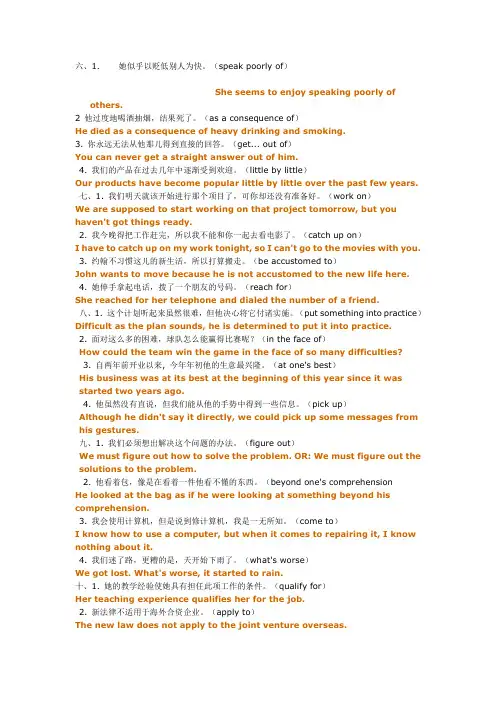
六、1. 她似乎以贬低别人为快。
(speak poorly of)She seems to enjoy speaking poorly of others.2 他过度地喝酒抽烟,结果死了。
(as a consequence of)He died as a consequence of heavy drinking and smoking.3. 你永远无法从他那儿得到直接的回答。
(get... out of)You can never get a straight answer out of him.4. 我们的产品在过去几年中逐渐受到欢迎。
(little by little)Our products have become popular little by little over the past few years.七、1. 我们明天就该开始进行那个项目了,可你却还没有准备好。
(work on)We are supposed to start working on that project tomorrow, but you haven't got things ready.2. 我今晚得把工作赶完,所以我不能和你一起去看电影了。
(catch up on)I have to catch up on my work tonight, so I can't go to the movies with you.3. 约翰不习惯这儿的新生活,所以打算搬走。
(be accustomed to)John wants to move because he is not accustomed to the new life here. 4. 她伸手拿起电话,拨了一个朋友的号码。
(reach for)She reached for her telephone and dialed the number of a friend.八、1. 这个计划听起来虽然很难,但他决心将它付诸实施。
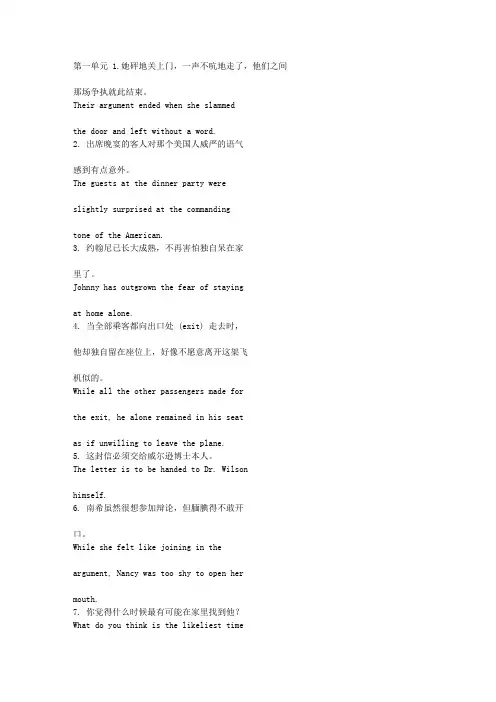
第一单元 1.她砰地关上门,一声不吭地走了,他们之间那场争执就此结束。
Their argument ended when she slammedthe door and left without a word.2. 出席晚宴的客人对那个美国人威严的语气感到有点意外。
The guests at the dinner party wereslightly surprised at the commandingtone of the American.3. 约翰尼已长大成熟,不再害怕独自呆在家里了。
Johnny has outgrown the fear of stayingat home alone.4. 当全部乘客都向出口处 (exit) 走去时,他却独自留在座位上,好像不愿意离开这架飞机似的。
While all the other passengers made forthe exit, he alone remained in his seatas if unwilling to leave the plane.5. 这封信必须交给威尔逊博士本人。
The letter is to be handed to Dr. Wilsonhimself.6. 南希虽然很想参加辩论,但腼腆得不敢开口。
While she felt like joining in theargument, Nancy was too shy to open hermouth.7. 你觉得什么时候最有可能在家里找到他?What do you think is the likeliest timeto find him at home?8. 猎人一看见有只狐狸从树丛中出现并向他设下 (lay) 的陷阱 (trap) 方向跑去,脸上顿时闪出了兴奋的表情。
The hunter’s face lit up with excitement as soon as he saw a fox emerge from among the bushes and run in the direction of / make for the trap he had laid第二单元翻译1) 会上有人建议任命一个十一人委员会来制定新章程。
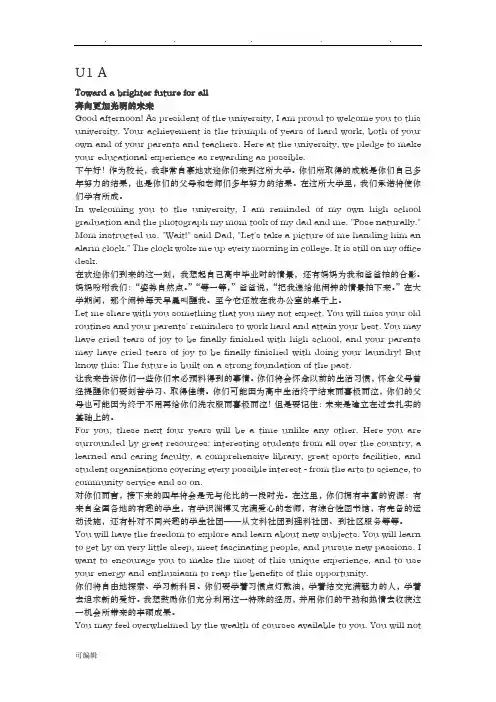
U1 AToward a brighter future for all奔向更加光明的未来Good afternoon! As president of the university, I am proud to welcome you to this university. Your achievement is the triumph of years of hard work, both of your own and of your parents and teachers. Here at the university, we pledge to make your educational experience as rewarding as possible.下午好!作为校长,我非常自豪地欢迎你们来到这所大学。
你们所取得的成就是你们自己多年努力的结果,也是你们的父母和老师们多年努力的结果。
在这所大学里,我们承诺将使你们学有所成。
In welcoming you to the university, I am reminded of my own high school graduation and the photograph my mom took of my dad and me. "Pose naturally." Mom instructed us. "Wait!" said Dad, "Let's take a picture of me handing him an alarm clock." The clock woke me up every morning in college. It is still on my office desk.在欢迎你们到来的这一刻,我想起自己高中毕业时的情景,还有妈妈为我和爸爸拍的合影。
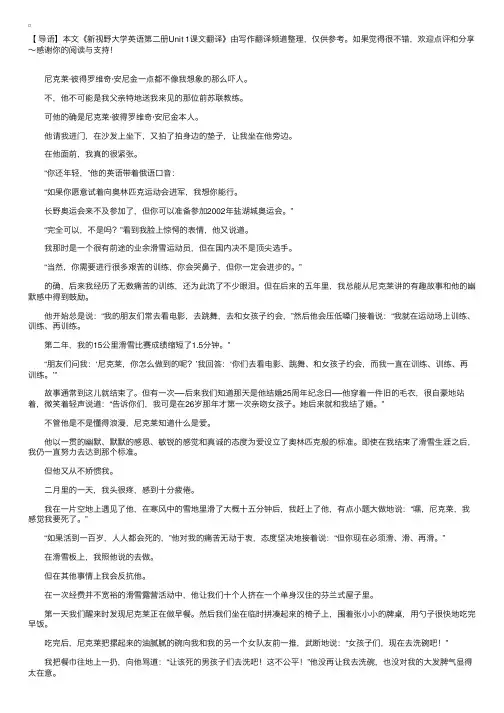
【导语】本⽂《新视野⼤学英语第⼆册Unit 1课⽂翻译》由写作翻译频道整理,仅供参考。
如果觉得很不错,欢迎点评和分享~感谢你的阅读与⽀持! 尼克莱·彼得罗维奇·安尼⾦⼀点都不像我想象的那么吓⼈。
不,他不可能是我⽗亲特地送我来见的那位前苏联教练。
可他的确是尼克莱·彼得罗维奇·安尼⾦本⼈。
他请我进门,在沙发上坐下,⼜拍了拍⾝边的垫⼦,让我坐在他旁边。
在他⾯前,我真的很紧张。
“你还年轻,”他的英语带着俄语⼝⾳: “如果你愿意试着向奥林匹克运动会进军,我想你能⾏。
长野奥运会来不及参加了,但你可以准备参加2002年盐湖城奥运会。
” “完全可以,不是吗?”看到我脸上惊愕的表情,他⼜说道。
我那时是⼀个很有前途的业余滑雪运动员,但在国内决不是顶尖选⼿。
“当然,你需要进⾏很多艰苦的训练,你会哭⿐⼦,但你⼀定会进步的。
” 的确,后来我经历了⽆数痛苦的训练,还为此流了不少眼泪。
但在后来的五年⾥,我总能从尼克莱讲的有趣故事和他的幽默感中得到⿎励。
他开始总是说:“我的朋友们常去看电影,去跳舞,去和⼥孩⼦约会,”然后他会压低嗓门接着说:“我就在运动场上训练、训练、再训练。
第⼆年,我的15公⾥滑雪⽐赛成绩缩短了1.5分钟。
” “朋友们问我:‘尼克莱,你怎么做到的呢?’我回答:‘你们去看电影、跳舞、和⼥孩⼦约会,⽽我⼀直在训练、训练、再训练。
’” 故事通常到这⼉就结束了。
但有⼀次──后来我们知道那天是他结婚25周年纪念⽇──他穿着⼀件旧的⽑⾐,很⾃豪地站着,微笑着轻声说道:“告诉你们,我可是在26岁那年才第⼀次亲吻⼥孩⼦。
她后来就和我结了婚。
” 不管他是不是懂得浪漫,尼克莱知道什么是爱。
他以⼀贯的幽默、默默的感恩、敏锐的感觉和真诚的态度为爱设⽴了奥林匹克般的标准。
即使在我结束了滑雪⽣涯之后,我仍⼀直努⼒去达到那个标准。
但他⼜从不娇惯我。
⼆⽉⾥的⼀天,我头很疼,感到⼗分疲倦。
英语第一单元A heated discus sionaboutwhethe r men are braver than womenis settle d in a rather unexpe ctedway.关于男人是否比女人更勇敢的一场激烈争论以一种颇为出人意料的方式解决了。
closeThe Dinner PartyM ona Gardne r 1RT I firstheardthis tale in India, whereit is told as if true — though any natura listwouldknow it couldn't be. Latersomeon e told me thatthe storyappear ed in a magazi ne shortl y before the FirstWorldWar. That magazi ne story, and the person who wroteit, I have neverbeenable to trackdown.晚宴莫娜·加德纳我最初听到这个故事是在印度,那儿的人们今天讲起它来仍好像确有其事似的——尽管任何一位博物学家都知道这不可能是真的。
后来有人告诉我,在第一次世界大战之前不久,一家杂志曾刊登过这个故事。
但登在杂志上的那篇故事以及写那篇故事的人,我却一直未能找到。
close2RT The countr y is India. A coloni al offici al and his wife are giving a largedinner party. They are seated with theirguests— office rs and theirwives, and a visiti ng Americ an natura list— in theirspacio us dining room, whichhas a bare marble floor, open rafter s and wide glassdoorsopenin g onto a verand a.故事发生在印度。
第三课酒肆闲聊与标准英语人类的一切活动中,只有闲谈最宜于增进友谊,而且是人类特有的一种活动。
动物之间的信息交流,不论其方式何等复杂,也是称不上交谈的。
闲谈的引人人胜之处就在于它没有一个事先定好的话题。
它时而迂回流淌,时而奔腾起伏,时而火花四射,时而热情洋溢,话题最终会扯到什么地方去谁也拿不准。
要是有人觉得“有些话要说”,那定会大煞风景,使闲聊无趣。
闲聊不是为了进行争论。
闲聊中常常会有争论,不过其目的并不是为了说服对方。
闲聊之中是不存在什么输赢胜负的。
事实上,真正善于闲聊的人往往是随时准备让步的。
也许他们偶然间会觉得该把自己最得意的奇闻轶事选出一件插进来讲一讲,但一转眼大家已谈到别处去了,插话的机会随之而失,他们也就听之任之。
或许是由于我从小混迹于英国小酒馆的缘故吧,我觉得酒瞎里的闲聊别有韵味。
酒馆里的朋友对别人的生活毫无了解,他们只是临时凑到一起来的,彼此并无深交。
他们之中也许有人面临婚因破裂,或恋爱失败,或碰到别的什么不顺心的事儿,但别人根本不管这些。
他们就像大仲马笔下的三个火枪手一样,虽然日夕相处,却从不过问彼此的私事,也不去揣摸别人内心的秘密。
有一天晚上的情形正是这样。
人们正漫无边际地东扯西拉,从最普通的凡人俗事谈到有关木星的科学趣闻。
谈了半天也没有一个中心话题,事实上也不需要有一个中心话题。
可突然间大伙儿的话题都集中到了一处,中心话题奇迹般地出现了。
我记不起她那句话是在什么情况下说出来的——她显然不是预先想好把那句话带到酒馆里来说的,那也不是什么非说不可的要紧话——我只知道她那句话是随着大伙儿的话题十分自然地脱口而出的。
“几天前,我听到一个人说‘标准英语’这个词语是带贬义的批评用语,指的是人们应该尽量避免使用的英语。
”此语一出,谈话立即热烈起来。
有人赞成,也有人怒斥,还有人则不以为然。
最后,当然少不了要像处理所有这种场合下的意见分歧一样,由大家说定次日一早去查证一下。
于是,问题便解决了。
新概念英语第二册课文及翻译Lesson 1 A private conversation私人谈话Last week I went to the theatre. I had a very good seat.The play was very interesting.I did not enjoy it.A young man and a young woman were sitting behind me. They were talking loudly. I got very angry. I could not hear the actors. I turned round. I looked at the man and the woman angrily(状语). They did not pay any attention. In the end, I could not bear it. I turned round again. 'I can't hear a word!' I said angrily.‘It’s none of your business,' the young man said rudely. 'This is a private conversation!'.上星期我去看戏。
我的座位很好,戏很有意思,但我却无法欣赏。
一青年男子与一青年女子坐在我的身后,大声地说着话。
我非常生气,因为我听不见演员在说什么。
我回过头去怒视着那一男一女,他们却毫不理会。
最后,我忍不住了,又一次回过头去,生气地说:“我一个字也听不见了!”“不关你的事,”那男的毫不客气地说,“这是私人间的谈话!”【NEW WORDS AND EXPRESSIONS】生词和短语★private adj.私人的it's my private letter/house ;美式英语private school:私立学校英式英语:公学ETON (private school)privacy:隐私it's a privacy. adj.《Private Ryan》private soldier:大兵private life:私生Letter n. 首字母public:公众的,公开的public school ;public letter 公开信;public place :公共场所★conversation n.谈话uni verse转动uniformUni--bi--tri--quar-pent-sex/hex-sept-oct-nov---decBilateral trade 双边贸易triangle quarter pentagon sex古罗马历法10个月---12凯撒大帝julis---July 七月屋大维augusto--August 八月September九月(原七月)---septwolvesOctober 十月(原八月)---octopusNovemberDecember----decadesubject of conversation:话题辨析:conversation, dialogue, talk, chat这些名词均含“交谈”之意。
新概念英语第2册课文1 A private conversation私人谈话Last week I went to the theatre. I had a very good seat. The play was very interesting. I did not enjoy it. A young man and a young woman were sitting behind me. They were talking loudly. I got very angry. I could not hear the actors. I turned round. I looked at the man and the woman angrily. They did not pay any attention. In the end, I could not bear it. I turned round again. 'I can't hear a word!' I said angrily.'It's none of your business,' the young man said rudely. 'This is a private conversation!'上星期我去看戏。
我的座位很好。
发挥是很有趣的。
我不喜欢它。
一青年男子与一年轻女子坐在我的身后。
他们在大声地说话。
我很生气。
我听不见演员。
我转过身。
我看着那个男人和女人生气。
他们没有注意。
最后,我忍不住了。
我又一次转过身去。
”我不能听到一个字!”我愤怒地说。
”这不关你的事,”那男的毫不客气地说。
”这是私人间的谈话!”2 Breakfast or lunch?早餐还是午餐?It was Sunday. I never get up early on Sundays. I sometimes stay in bed until lunchtime. Last Sunday I got up very late. I looked out of the window. It was dark outside. 'What a day!' I thought. 'It's raining again.' Just then, the telephone rang. It was my aunt Lucy. 'I've just arrived by train,' she said. 'I'm coming to see you.''But I'm still having breakfast,' I said.'What are you doing?' she asked.'I'm having breakfast,' I repeated.'Dear me,' she said. 'Do you always get up so late? It's one o'clock!'它是星期日。
Unit 1An impressive English lesson1 If I am the only parent who still corrects his child's English, then perhaps my son is right. To him, I am a tedious oddity: a father he is obliged to listen to and a man absorbed in the rules of grammar, which my son seems allergic to.2 I think I got serious about this only recently when I ran into one of my former students, fresh from an excursion to Europe. "How was it?" I asked, full of earnest anticipation.3 She nodded three or four times, searched the heavens for the right words, and then exclaimed, "It was, like, whoa!"4 And that was it. The civilization of Greece and the glory of Roman architecture were captured in a condensed non-statement. My student's "whoa!" was exceeded only by my head-shaking distress.5 There are many different stories about the downturn in the proper use of English. Surely students should be able to distinguish between their/there/they're or the distinctive difference between complimentary and complementary. They unfairly bear the bulk of the criticism for these knowledge deficits because there is a sense that they should know better.6 Students are not dumb, but they are being misled everywhere they look and listen. For example, signs in grocery stores point them to the stationary, even though the actual stationery items — pads, albums and notebooks —are not nailed down. Friends and loved ones often proclaim they've just ate when, in fact, they've just eaten. Therefore, it doesn't make any sense to criticize our students.7 Blame for the scandal of this language deficit should be thrust upon our schools, which should be setting high standards of English language proficiency. Instead, they only teach a little grammar and even less advanced vocabulary. Moreover, the younger teachers themselves evidently have little knowledge of these vital structures of language because they also went without exposure to them. Schools fail to adequately teach the essential framework of language, accurate grammar and proper vocabulary, while they should take the responsibility of pushing the young onto the path of competent communication.8 Since grammar is boring to most of the young students, I think that it must be handled delicately, step by step. The chance came when one day I was driving with my son. As we set out on our trip, he noticed a bird in jerky flight and said, "It's flying so unsteady." I carefully asked, "My son, how is the bird flying?" "What's wrong? Did I say anything incorrectly?" He got lost. "Great! You said incorrectly instead of incorrect. We use adverbs to describe verbs. Therefore, it's flying so unsteadily but not so unsteady."9 Curious about my correction, he asked me what an adverb was. Slowly, I said, "It's a word that tells you something about a verb." It led to his asking me what a verb was. I explained, "Verbs are action words; for example, Dad drives the truck. Drive is the verb because it's the thing Dad is doing."10 He became attracted to the idea of action words, so we listed a few more: fly, swim, dive, run. Then, out of his own curiosity, he asked me if other words had names for their use and functions. This led to a discussion of nouns, adjectives, and articles. Within the span of a 10-minute drive, he had learned from scratch to the major parts of speech in asentence. It was painless learning and great fun!11 Perhaps, language should be looked upon as a road map and a valuable possession: often study the road map (check grammar) and tune up the car engine (adjust vocabulary). Learning grammar and a good vocabulary is just like driving with a road map in a well-conditioned car.12 The road map provides the framework and guidance you need for your trip, but it won't tell you exactly what trees or flowers you will see, what kind of people you will encounter, or what types of feelings you will be experiencing on your journey. Here, the vocabulary makes the journey's true colors come alive! A good vocabulary enables you to enjoy whatever you see as you drive along. Equipped with grammar and a good vocabulary, you have flexibility and excellent control. While the road map guides your journey to your destination, an excellent vehicle helps you to fully enjoy all of the sights, sounds and experiences along the way.13 Effective, precise, and beneficial communication depends upon grammar and a good vocabulary, the two essential assets for students, but they are not being taught in schools.14 Just this morning, my son and I were eating breakfast when I attempted to add milk to my tea. "Dad," he said, "If I were you, I wouldn't do that. It's sour."15 "Oh my!" I said, swelling with pride toward my son, "That's a grammatically perfect sentence. You used were instead of was."16 "I know, I know," he said with a long agreeable sigh. "It's the subjunctive mood."17 I was, like, whoa!Translation一堂难忘的英语课1 如果我是唯一一个还在纠正小孩英语的家长,那么我儿子也许是对的。
NCE-2:最后另附有纯翻译部分Lesson1 A private conversation私人谈话Last week I went to the theatre. I had a very good seat.上星期我去看戏。
我的座位很好,The play was very interesting. I did not enjoy it.戏很有意思,但我却无法欣赏。
A young man and a young woman were sitting behind me. They were talking loudly.一青年男子与一青年女子坐在我的身后,大声地说着话。
I got very angry. I could not hear the actors.我非常生气,因为我听不见演员在说什么。
I turned round. I looked at the man and the woman angrily.我回过头去怒视着那一男一女,They did not pay any attention.他们却毫不理会。
In the end ,I could not bear it.最后,我忍不住了,I turned round again.‘I can’t hear a word!’ I said angrily.又一次回过头去,生气地说:“我一个字也听不见了!”‘It’s none of your business,’ the young man said rudely.‘This is a private conversation!’“不关你的事,”那男的毫不客气地说,“这是私人间的谈话!”Lesson2 Breakfast or lunch?早餐还是午餐?It was Sunday. I never get up early on Sundays.那是个星期天。
而在星期天我是从来不早起的。
I sometimes stay in bed until lunchtime.有时我要一直躺到吃午饭的时候。
一、 要提高我们的英语水平,关键是多读、多写、多听、多说。此外,尽可能多背熟一些好文章也十分重要。如果你脑子里没有储存大量好的英语文章,你就不能用英语自由地表达自己的思想。一边学一边总结经验也很有帮助,因为这样做,我们就能搞明白哪种学习方法是更有效的,能够产生最理想的效果。只要我们坚持努力学习,到时候我们就会完成掌握英语的任务。 翻译:To improve our English, it is critical to do more reading, writing, listening and speaking. Besides, learning by heart as many well-written essays as possible is also very important. Without an enormous store of good English writing in your head, you can not express yourself freely in English. It is also helpful to summarize our experience as we go along, for in so doing, we can figure out which way of learning is more effective and will produce the most desirable result. As long as we keep wororking hard on it, we will in due course accomplish the task of mastering English. 二、随着捐款源源不断的进来,我校明年的财务状况会好多了。这样我们就能集中应对我们作为教育工作者必须承担的最重要的任务:鼓励学生实现它们的学业目标,培养他们成为有责任感、靠得住的人,使他们对将来的生活有所准备,并在他们追求物质及精神满足的过程中给予引导 翻译: With more and more donations coming in, our university will be much better off financially next year. We will thus be able to focus on the most important task that we, educators, must take on: to encourage students to attain their scholarly/academic goals, to train them to be dependable and responsible individuals, to prepare them for the life ahead, and to guide them in their pursuit of spiritual as well as material satisfaction.
三、约翰逊先生的儿子乔治爱在晚上听重金属(heavy mental )音乐,这使社区其他居民无法入眠。疲惫不堪的邻居们终于失去耐心,决定直接干预。他们打电话给约翰逊先生,坦率地把想法告诉了他。约翰逊先生向邻居保证他一定会解决这个问题。放下电话他便去训斥儿子:“你这是怎么了?你该懂得不能为了你自己的娱乐而妨碍(disturb)别人。”结果乔治拿CD跟同学换了电脑游戏软件。
翻译:George, the son of Mr. kJohnson, liked listening to heavy metal music in the evenings, which made it hard for other residents in the community to fall asleep. Eventually the exhausted neighbors lost their patience and decided on direct interference. They called Mr. Johnson to tell him in a frank manner what they were thinking. Mr. Johnson assured them that he would certainly settle the issue. As soon as he put down the phone he scolded his son, “What has come over you? You should know better than to disturb others for your own amusement.” In the end George traded his CD’s for computer games software from his classmates.
四、也许你羡慕我,因为我可以借助计算机在家里工作。我也这么想,互联网使我的工作方便多了。我可以通过电子邮件撰写、剪辑并交出我的文章,在网上与我的同事聊天,与老板讨论工作。我用鼠标一击,马上就能拿到我要的一切资料,获得最新的消息。可是,另一方面,用网络通信有时也令人沮丧。系统有可能瘫痪,更糟的是,因为没有面对面交谈的感情提示,键出的词有时候似乎很难理解。
翻译:Perhaps you envy me for being able to work from home on the computer. I agree that the Internet has made my job a lot easier. I can write,submit and edit articles via email, chat with my colleagues on line and discuss work with my boss. With a click of the mouse, I can get all the data I need and keep up with the latest news. But then, communicating through the Net can be frustrating at times. The system may crash. Worse still, without the emotional cues of face-to-face communication, the typed words sometimes seem difficult to interpret。
五 、众多事实证明这一说法:要想让自己很快从低落的(negative)情绪中解脱出来,你得让自己哭。你不必为“哭”而感到愧疚。忧虑和悲伤能随同眼泪一起流出身体。
看一看唐娜(Donna) 的例子吧。她的儿子在一次车祸中不幸丧生,这次打击之大使她欲哭无泪。她说:“知道两个星期后的一天,我才开始放身痛哭。然后,我便觉得好像一块大石头从我的肩上抬走了。是眼泪将我带回到了现实之中,帮助我度过危机。”
翻译 :Numerous facts bear out the argument/statement/claim that in order to recover speedily from negative emotion, you should allow yourself to cry. You needn’t/don’t have to be ashamed of crying. Anxiety and sorrow can flow out of the body along with tears.
Consider the case of/Take Donna, Her son unfortunately died in a car accident. The intensity of the blow made her unable to cry. She said, “It was not until two weeks later that I began to cry. And then I felt as if a big stone had been lifted from my shoulders. It was the tears that brought me back to earth and helped me survive the crisis.
六、南希.霍普金斯(Nancy Hopking)是麻省理工学院(MIT)的生物学教授。她渴望知识,努力工作。然而,作为一名科学家,她不能不注意到校园里男女不平等(gender inequality)的各种表现。男女教授做同样的工作,但是到提升的时候,行政领导却很有选择性。具有讽刺意味的是在取得这么多的文化进步以后,妇女在高等学府却仍然处于不利的地位。当她增加实验室面积的请求被拒之后,她知道她必须起来抗争。因此她咬紧牙关向校长申诉。这次抗争以胜利告终,南希也因此变成了男女不平等的倡导者。
翻译: Nancy Hopkins is a biology professor at MIT. She craves knowledge and works hard. However, as a scientist, she could not help noticing all kinds of indications of gender inequality on campus. Men and women professors did the same work, but when it came to promotion the administrators were rather selective. It was ironic that after so much cultural progress, women were still at a